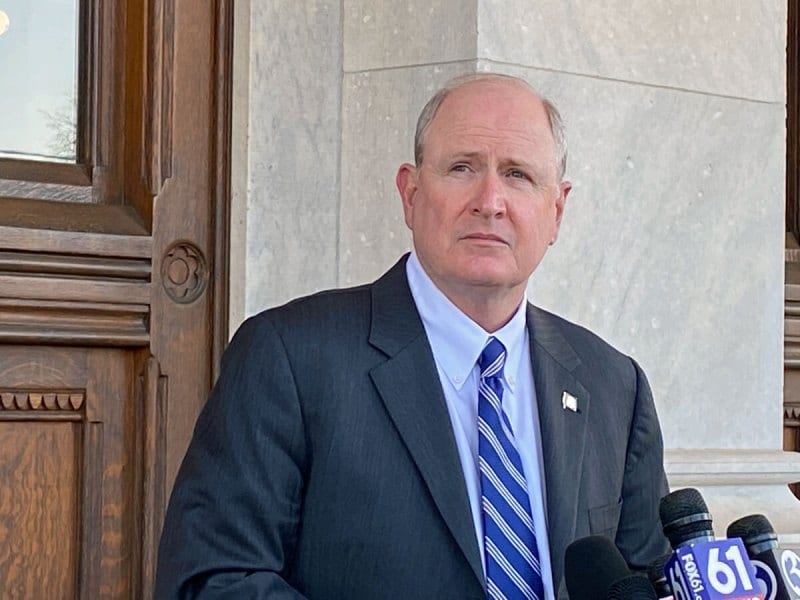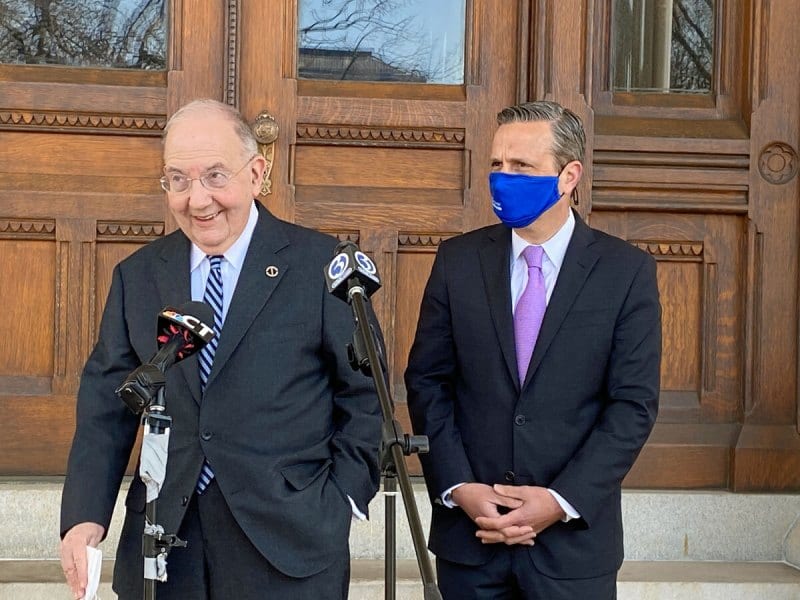Lamont, Democrats Seek to Extend Executive Powers over Republican Objections

Audio By Carbonatix

Senate Minority Leader Kevin Kelly outside the state Capitol. Photo credit: Christine Stuart, CTNewsJunkie.com
The House plans to vote Thursday on an extension of the governor’s executive authority.
By Hugh McQuaid, CTNewsJunkie.com
Legislative Republicans bristled Tuesday as Democrats planned a Thursday vote in the House of Representatives to extend Gov. Ned Lamont’s emergency authority and some of his pandemic-related executive orders for another 30 days.
Lamont and the legislature’s majority party signaled last week plans to continue the governor’s emergency declarations, which serve as the basis for the wide range of executive actions he has taken as a result of the pandemic.
The declarations had been scheduled to lapse on April 20 but Lamont said he would seek authorization from the legislature to continue them, in part to ensure the state remained eligible for federal funding through the Federal Emergency Management Agency.
The governor met last week with Democratic leaders to discuss the extension. During a Thursday press conference he said his administration planned to meet with all leaders, including Republicans, “first thing” this week. Republicans say the meeting has not happened and the House has scheduled a vote on the emergency powers for Thursday afternoon.
“It’s disappointing that the governor feels this is an okay way to conduct business and I think it’s a slap in the face to the democratic process,” House Minority Leader Vincent Candelora said Tuesday.
House Speaker Matt Ritter said he had been in contact with Candelora on a near-daily basis to discuss the emergency orders. Ritter said there were good reasons to continue them. He pointed to the federal funding, procurement issues related to the vaccination effort, and providing certainty to municipalities that they could conduct town referendums with easier access to absentee ballots.
“I understand and appreciate that [Republicans] might want a more holistic approach to this as opposed to this 30-day bridge, but I’m not sure there’s another way to do it that keeps Connecticut residents getting their vaccines and their COVID testing and their mask mandates in place if we don’t have this bridge,” Ritter said.
Candelora argued that Democrats have already had time to codify many of the issues raised by COVID, but have been focused on a variety of other legislative issues instead. The further into the session the governor’s emergency powers are extended, the more difficult it will be for the legislative branch to dedicate time to topics other than the state’s two-year budget, he said.
“This was a crisis by design,” Candelora said.
Senate Minority Leader Kevin Kelly agreed during a press conference outside the state Capitol building Tuesday morning. He said Democrats have known since January when the executive orders were set to expire.
“They asked for that date. That is when the homework assignment is due but yet they’re like the student who comes to class and says ‘Hey, I dont have my homework today, teacher. Can you give me an extension?’” Kelly said. “I think it’s time that the legislature rightfully and constitutionally gets its voice back.”

Senate President Martin Looney and Majority Leader Bob Duff. Photo credit: Christine Stuart, CTNewsJunkie.com
During a separate press conference, Senate Democrats called Connecticut a national leader for its handling of the pandemic. Senate President Martin Looney said the state has shortened the duration of Lamont’s emergency authority with each extension in an “orderly” phasing-out of emergency executive power.
“The Republicans have not, to my knowledge, have not proposed one executive order that they would vehemently object to and seek to repeal or introduce a bill to repeal,” Looney said. “So once again, I think they are making a process argument here that isn’t really valid.”
Looney largely dismissed Republican concerns.
“We’re happy to have the conversation with the Republicans who represent only one-third of the state Senate,” Looney added.
Kelly said that’s an “arrogant perspective on their view of what are government should and shouldn’t be.”
During the planned House debate Thursday, Candelora said he expected some “impassioned remarks” from members of his caucus who feel differently.
“I don’t think it will be a filibuster,” he said of the debate that is not expected to begin until mid to late afternoon. “But I do think it will take some time.”
Candelora said some of the frustration could have been dissipated if the governor’s office had met with Republicans as Lamont had indicated last week.
“Any time you get somebody in the room it does deflate the situation. There could have been compromises made that may have satisfied Republicans. But to choose to take this route of excluding us from the process and not wanting to listen to us, it certainly can create more outrage,” he said.
Ritter said he believed the legislature would eventually settle on a bipartisan consensus on the state’s handling of the COVID crisis.
“As we get into May and beyond, I’m very hopeful the solution to this is bipartisan,” he said. “I think it will be.”
Republished with permission from CTNewsJunkie.com, all rights reserved.
Like what you see here? Click here to subscribe to We-Ha’s newsletter so you’ll always be in the know about what’s happening in West Hartford! Click the blue button below to become a supporter of We-Ha.com and our efforts to continue producing quality journalism.



